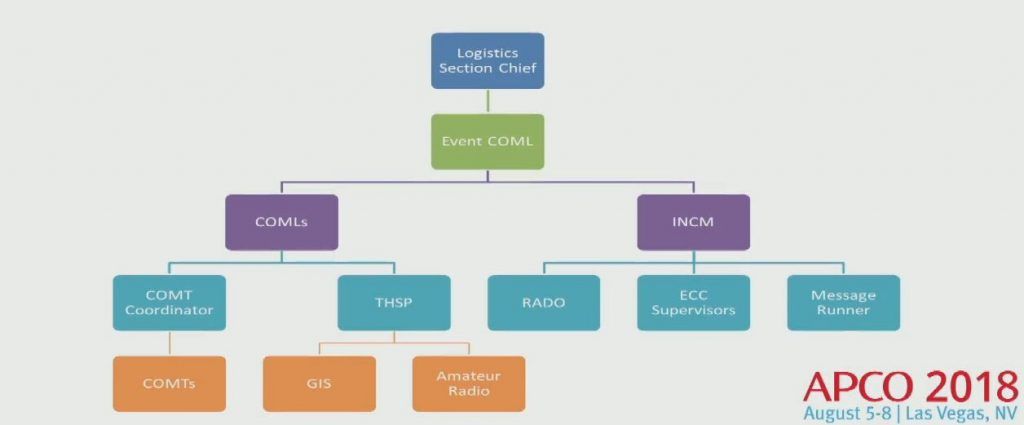At the Association of Public-Safety Communications Officials’ (APCO’s) annual conference last year, the organization hosted a professional development session titled Large Event Public Safety Communications and Interoperability Planning, featuring emergency communications supervisor Sara Boucher-Jackson and emergency operations manager Janelle Harris.
Boucher-Jackson and Harris were part of the incident center team responsible for communications operations when Minneapolis hosted Super Bowl LII in 2018. They examined the core elements every large event security communications plan should have and discussed how their security communications plans served them during planned events, such as the Super Bowl, as well as unplanned events, such as the 2007 I-35W Mississippi River bridge collapse and 2017 Minnehaha Academy gas explosion.
8 Key Takeaways on Developing Large Event Security Communications Plans
#1 Get off on the right foot.
Even if your event isn’t happening for another two years, it’s critical to begin the planning process with structure in mind.
“It’s easy to lose sight of your scope and all of a sudden have way too much on your plate that when you take a step [back], you’re kind of like, ‘How did I get sucked into this?’” Harris said.
For Super Bowl LII, Boucher-Jackson and Harris cooperated with organizations including local police and fire, regional communications task forces, the FBI, Air Force and handfuls of smaller agencies in between. They said it can be difficult to stay on track when you’re working with multiple agencies in numerous municipalities to coordinate a large event.
“That’s why I strongly encourage you to define that scope of responsibility early and stay in that box,” Harris said.
To that end, Harris advised setting a timeline to clearly outline what you need to complete leading up to your event -- and remember, this isn’t the time to consult your wishlist.
“It’s super fun to sit back and say, ‘I have two years to get this done, wouldn’t it be nice to have all-new communications equipment and all new dispatch furniture?’ No, that’s not realistic,” Harris said.
Don’t underestimate the role of dispatch and emergency communications,” Boucher-Jackson said. “We are the ones who bring everybody to the sandbox to play together.”
#2 Don’t reinvent the wheel.
Effective large event planning is all about working smarter, not harder. After action reports from similar events can save your organization valuable time and energy.
For the Super Bowl, Boucher-Jackson and Harris consulted with previous host cities similar in size to Minneapolis.
“We focused on finding after action reports from events that took place in cities or setups like ours,” Boucher-Jackson said. “We leaned towards [Super Bowl XLVIII in New Jersey] because they were more compressed and involved a lot of different metro areas.”
Reaching out to others for their experience can also help you learn from their mistakes and clarify your goals for your own event, Boucher-Jackson said.
“A constant theme in after action reports ... that we’ve reviewed is that at some point, there’s a negative reflection of communications,” she said. “So we set our goal in very plain terms, very bluntly. Our goal was that we will not have [our after action report] say that communications sucked. And [in the after action report of the Super Bowl], it didn’t. So we did achieve our goal.”
#3 Create a budget.
You know what you need to accomplish -- but who’s paying for it, and how can you ensure your organization has a say in where the money goes?
According to Harris, figuring out the details of your budget early will set you up for success later in your timeline.
“The first question you should ask is, is it one entity or are there multiple entities that hold the purse strings [for your event]?” Harris said. “And what can you do to make sure you’re [at] the table when they’re discussing budgets?”
It’s also important to factor in elements such as staffing and overtime.
“For the Super Bowl, we had so many extra meetings and training sessions,” Harris said. “We ended up staffing five different command posts with communications personnel, and we had over 30 tactical dispatchers and tactical incident center managers and radio COMTs. That’s all extra above and beyond special duty [things] you have to consider when building a budget.”
Conducting a sweep of your inventory early in the process can also help when it comes to making budget decisions.
“Is what we currently have now going to get us where we need to be?” Harris asked when preparing for the Super Bowl. “If so, awesome, but if there’s upgrades that need to happen, or your need to purchase more, it’s good to identify that early and build that into the budget.”
#4 Work together.
When Boucher-Jackson and Harris were making Super Bowl preparations, they had 46 different planning groups and assigned a communications leader to each one. Identifying and uniting communications personnel from each group and agency helped streamline the process for all involved.
“We [told our communications leaders], ‘Don’t wait for the invite,’” Boucher-Jackson said. “We’re going to go even if we were just simply saying ‘We’re here to observe and see if there’s anything we can do to support you.’”
Initiating cooperation ultimately enabled Boucher-Jackson and Harris’ team to take the lead down the line.
“It ended up, as we got closer to the operational period, that those incident commanders were turning around and looking to us for the answers when it came to communications,” Boucher-Jackson said.
Depending on the size of your event, it’s worthwhile to keep in touch with communications partners from all levels -- from local departments all the way up to federal agencies, in Boucher-Jackson’s and Harris’ cases.
#5 Don’t let anyone box you out.
With so many ‘cooks in the kitchen,’ it can be hard to get a place at the table. Don’t be afraid to be assertive, Boucher-Jackson said.
“What I told all the communications unit leaders when they’d go out to meetings was, ‘You have to be the syringe. You’ve got to inject yourself into that situation and extract the information.’”
Relying on incident command structure can help ensure no one is side-stepped during the planning process or while responding to issues during the event. Additionally, Boucher-Jackson said an established incident command structure is ideal for overall interoperability and is useful for both planned events and emergencies.

The chart Boucher-Jackson and Harris’ team followed during Super Bowl LII.
#6 Apply past lessons to new ventures.
Experience responding to unplanned events can help when it comes time to prepare for planned events. Boucher-Jackson and Harris’ teams were able to apply many lessons learned from responding to the 2007 I-35W Mississippi River bridge collapse to their efforts on Super Bowl LII.
“In the bridge collapse, we learned that [on the radios] people like to talk too much, or … switch to the wrong talk-groups,” Boucher-Jackson said. “We teach our dispatchers early on about the ABCS of broadcasting -- accuracy, brevity, clarity and speed -- so we went out and reminded tactical dispatchers [as well as law enforcement partners] that these were crucial parts of radio comms.”
#7 Transition into the operational period with open eyes.
After months or even years of planning and prep work, it can be tempting to switch on the autopilot and coast until showtime -- but how well you transition into your operational period can impact the overall success of your event.
For Jackson-Boucher and Harris, increased communication gave the team behind Super Bowl LII a boost as they transitioned into operation.
“We made sure everybody knew when we were transitioning from the planning period to the operational period,” Harris said.
This included distributing physical copies of the security communications plan and reference material to all personnel, venues and locations, as well as electronic distribution to ensure everyone could consult the same version.
Harris also recommended being available to answer questions and go over details at every orientation session and walkthrough.
#8 Know when and who to ask for help.
Not everything will go according to plan or happen on schedule. Having an alternate communications plan can be a lifesaver when your area experiences a power outage, or if a cell tower goes down.
Additionally, it’s important to work closely and communicate effectively with every resource you have, Harris said. Local resources, such as IT staff and transit authorities, can handle immediate problems, while larger-scale organizations, such as a regional emergency services board or state patrol, can work with federal agencies to solve bigger issues.
“Keep in mind all of these partners are there, and they’re there to help,” she said.
Learn more about APCO 2019 being held August 11-14, 2019, in Baltimore.
Read more about large event security communications and planning:













